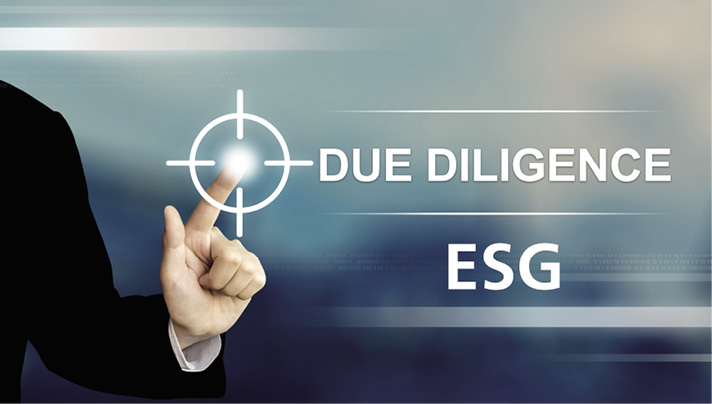Bildnachweis: pichetw – stock.adobe.com.
The topic of sustainability is moving further and further into the social focus. This also leads to legislative sharpening of sustainability criteria for companies. The German “Act on Corporate Due Diligence Obligations for the Prevention of Human Rights Violations in Supply Chains” (Lieferkettensorgfaltspflichtengesetz – LkSG), which will come into force on 1 January 2023, is just one example of this development. The generally increased relevance of ESG criteria will also significantly influence M&A transactions in the future. By Oliver Köster, LL.M. and Stephan Zuber, Baker Tilly
The acronym ESG stands for Environment, Social and Governance. It refers to the three major topic areas and associated criteria for measuring the sustainability of a company. If these criteria are taken into account in entrepreneurial action, business risks can be recognised and minimised at an early stage – and, corporate governance oriented towards ESG criteria pays off positively in a due diligence review. It reduces risk findings on the part of the buyer in the context of indemnification obligations, valuation discounts that reduce the purchase price as well as the principle of refraining from an acquisition intention.
Identification of ESG risks
In the course of a legal due diligence, a company is assessed with the aim of reviewing the legal risks and opportunities of a transaction and identifying possible solutions for identified risks. Since ESG criteria are for the most part not (yet) generally legally binding, they were previously given no or only limited consideration in a conventional due diligence review catalogue. In the meantime, however, this has changed fundamentally – especially for buyers who have committed themselves to certain sustainability criteria for their company or vis-à-vis their investors or customers. If buyers analyse for example the innovative capability of a company in light of ESG criteria, an investor can gain insights into an investee’s ability to follow the needs of the times. For such prospective buyers, an ESG assessment and the consideration of relevant questions and evidence in their due diligence requirements list is now an integral part of the due diligence scope.
With the help of an ESG due diligence, the ESG parameters relevant for the company can therefore be comprehensively analysed. If a high probability of occurrence of ESG risks is to be feared after such an analysis, relevant rectifications must be made: in order to avoid future sanctions in the form of fines or exclusion from certain tenders or contracts, for example. The results of an ESG review can then be incorporated into the transaction negotiations, especially in contract and price discussions.
The seller can ideally prepare for the requirements of the buyer side and the sales negotiations by carrying out a vendor (ESG) due diligence in advance, by internally anticipating such an ESG review for his (target) company. If ESG risks are identified in the process, the seller has the opportunity to actively reduce or eliminate them before offering his company or company shares on the market. This not only increases the potential circle of interested parties for the company being offered, but also enables the seller to highlight ESG compliance in his information documents in a way that increases the purchase price.
What is the content of an ESG due diligence?
In an ESG due diligence, companies are measured against their sustainability efforts. Depending on the industry, different issues become relevant. Developments and production of a new product such as a new drug must be reviewed considering environmental concerns (“E”). Single-use equipment, medical waste (including through packaging) and water-intensive pharmaceutical production are examples of the drivers of life sciences’ carbon footprint. Social concerns (“S”) play another important role in considering an investment. Any life sciences company rests upon the outcome of their clinical trials, any dishonest communication of testing results or infringement of data protection result in a red flag. In addition, for the S factor, the company’s supply chain is also considered. Due to the German LkSG at national level and in the future also at EU level, strict assessments are made as to whether contractual and business relationships have or can have a negative impact on internationally recognised human rights. On the governance side (“G”), a target company must be measured against principles such as equality, diversity and risk management. A board independent of the largest shareholders in the company places a life science company in a better position to make decision reflecting business ethics issues. At the core of all three categories, however, it is always a question of whether measures for sustainable corporate governance have been introduced in the company concerned and how efficient they are.
Consideration of ESG risks in the Sales and Purchase Agreement (SPA)
If ESG risks have been identified in the course of due diligence, they will inevitably flow into the purchase price and contract negotiations and, depending on the likelihood of the risks occurring, open up corresponding negotiating leeway for the buyer. For example, a price reduction can be demanded if ESG risks can be evaluated financially. This is regularly the case when fines are imminent. Alternatively, signing or closing conditions can be agreed, which set the adoption of a sustainability standard as a condition for the signing of the purchase agreement or its completion. Furthermore, it is possible to agree on the introduction of sustainability standards as a post-closing measure with a simultaneous deposit of parts of the purchase price into an escrow account. This gives the seller more time to establish sustainability measures or to make them more effective. If ESG risks have been identified but no measurable damage has yet been caused, the buyer can also demand indemnity from future fines and contractual penalties (so-called specific indemnity). Another option would be to include general or specific ESG guarantees if no risks were identified in the course of ESG due diligence or if ESG-relevant circumstances in the company could not be clarified.
ESG due diligence not (yet) a standard
Despite increasing sensitivity to sustainability issues in companies, politics, business and society, conducting ESG due diligence is not (yet) a standard procedure. Initially, it still means inconvenient, additional costs for sellers and buyers, which one may still try to avoid. However, ESG due diligence has already arrived in some transaction segments. In this respect, it is to be expected that it will sooner or later become established in practice due to further legislative initiatives, but also through the influence of investors who demand sustainability. The time required for a reasonable ESG due diligence should not be underestimated, which is why a reasonable period of time should be planned for its implementation.





